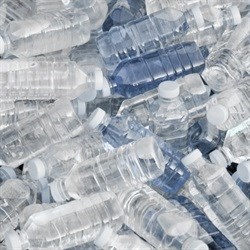
"We were hoping to see more impressive increases in the latest recycling results but the economic down-turn in the economy during 2013 had a direct impact on both the quantity and quality of plastic packaging that were available for recycling," says Anton Hanekom, Executive Director of Plastics SA, the mouthpiece of the South African plastics industry.
Both recyclers and converters agreed that shoppers spent less money on consumer items during the reporting period, resulting in fewer recyclables entering the waste stream. At the same time, the exchange rate favoured exports, resulting in 18,920 tons of waste plastics being exported during 2013 to be recycled elsewhere, instead of being used to the advantage of the local industry and economy.
"Due to the lack of plastics that were collected from households or businesses, recyclers were forced to source larger quantities of recyclables from landfills and other post-consumer sources; 66% compared to the 59% in 2012."
Recyclers are still of the opinion that the largest growth in recycling would be in post-consumer recyclables during the next few years.
The formal employment in plastics recycling decreased by 10.6% to 4,510 formal jobs since 2012. Of these, only 7.7% were contract workers (ie workers who were involved full time in the sorting of incoming materials for the recyclers, normally on site. These workers are paid for their output rather than for the time spent on the job).
At the same time, approximately 43,500 informal jobs were created in the collection industry. These collectors collect all recyclable materials and are not only limited to plastics. (The figures are based on 60kg of plastics waste handled per person per day and 200 good collection days per annum.)
"We are glad to have seen that recycling and sorting companies invested in training and on-the-job skills enhancement to improve the productivity of their labour forces, as well as invested in having new and more efficient equipment installed at their premises." As a result, there was a 15% increase in the formal recycling industry of tonnages processed per employee in the last year.
Looking ahead
The South African plastics industry recently announced its 'Zero Plastics to Landfill by 2030' objective and is engaging with all levels of government to achieve this target. Looking at the latest figures of the total tonnages of plastics that were effectively diverted from landfill, however, it is clear that there is still a long way to go.
The European plastics industry has stated that the maximum economic recycling rate for plastics is about 35%. South Africa, however, has a number of things in its favour that will allow it to exceed that number. Not only does it have the availability of cheaper sorters, it also has a dynamic and inventive recycling industry that can hold its own and develop its own end markets for recycled materials. One example is the recycling of thin films, where South Africa is far ahead of its European counterparts. Similarly, it is also developing a stronger non-packaging recycling industry for the polyolefins.
South Africa should be able to reach a 40% mechanical recycling rate if the following provisions are in place:
Clean-Up and Recycle Week
September is traditionally the month in which South Africans from all lifestyles are encouraged to 'spring clean' the environment in celebration of the arrival of spring. This year, the annual Clean-Up and Recycle Week will take place from 15-20 September, culminating in National Recycling Day on Friday 19 September and International Coastal Clean-Up Day on Saturday 20 September.
"South African consumers need to realise that they have an important role to play by separating their domestic waste into recyclables and non-recyclables at home (at source). Higher recycling rates influence and benefit all levels of society. It creates more jobs, it results in a cleaner country and it contributes to a lesser carbon footprint," concludes Hanekom.
For more information, go to www.plasticsinfo.co.za.